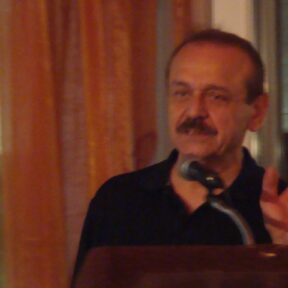
Yasser Abed Rabbo
: Photo from Creative Commons / Author of Photo: dlisbonaOverview
* Founder of the Palestine Media Center
* Minister of Cabinet Affairs for the Palestinian Authority
* Former ally of Yasser Arafat
* Opposes U.S. aid to Israel
Born in the town of Jaffa (located just south of Tel Aviv) in 1945, Yasser Abed Rabbo is the founder of the Palestine Media Center (PMC), which presents a pro-Palestinian version of news stories pertinent to the Arab-Israeli conflict in the Middle East. He also serves as the Minister of Cabinet Affairs and the Minister of Culture and Information for the Palestinian Authority (PA). Moreover, he has been a member of the Palestine Liberation Organization’s Executive Committee since 1971, and the head of the PLO Department of Information and Culture since 1974.
Rabbo holds a B.A. in economics and political science from the American University in Cairo. As a young man, he joined the Arab Nationalist Movement (ANM), which called for the creation of a socialist intellectual vanguard to lead a revolution promoting the group-identity, political unity, and social progress of all Arab peoples. When ANM’s Palestinian branch evolved in 1967 into the Popular Front for the Liberation of Palestine (PFLP), Rabbo assumed a leadership position in the new organization. Two years later the PFLP split into separate factions, one of which was called the Popular Democratic Front for the Liberation of Palestine. Rabbo identified closely with this Marxist-Leninist faction and became one of its leading figures in 1974 when it was renamed the Democratic Front for the Liberation of Palestine (DFLP).
In the late 1980s, Rabbo favored a two-state solution to the Arab-Israeli conflict and was active in drafting diplomatic proposals toward that end. He was also a member of a December 1988 delegation that met with U.S. diplomats in Tunis.
In the early 1990s, Rabbo supported Yasser Arafat’s duplicitous efforts to negotiate a two-state solution with Israel, and he became one of Arafat’s top advisors. During this same period, Rabbo took the helm of the Palestinian Democratic Group, FIDA — a party that had broken away from the DFLP, dropping its predecessor’s Marxist-Leninist platform and its emphasis on armed struggle.
In 1993 Rabbo became FIDA’s representative on the PLO Executive Committee, but stepped down later that year upon learning that Arafat had initiated parallel negotiations (which eventually would lead to the 1993 Oslo Accords) without informing him.
After the Oslo Accords (which Rabbo ultimately supported) had been signed, Rabbo returned to the West Bank and served as a cabinet member in Arafat’s government, becoming the PA’s Minister of Culture and Information in 1994.
After an April 2002 armed conflict in the West Bank town of Jenin — a conflict which Palestinian propagandists depicted as an unprovoked Israeli massacre of hundreds of innocent Palestinian civilians — Rabbo accused Israel of “digging mass graves for 900 Palestinians in the [Jenin refugee] camp.” Notably, Rabbo made no mention of the fact that Jenin had long served as a hiding and breeding ground for Palestinian bomb-making factories and terrorists intent on murdering Jews. Neither did he mention that post-battle aerial photographs showed that Israel had focused its firepower exclusively on a football-field-sized area where bomb factories were located — a very small section of Jenin. Nor did he point out that the Palestinian Authority‘s official count of deaths that had occurred in the Jenin battle was 56, of whom 48 were armed combatants.
In 2002 Rabbo resigned from FIDA after internal disputes but remained, with Arafat’s support, in the PA cabinet as an independent.
In 2003 Rabbo became Minister of Cabinet Affairs in the government of Arafat’s successor, Mahmoud Abbas.
Rabbo and his Palestine Media Center have repeatedly condemned U.S. aid to Israel, calling it a “reward for the policy of terror … against the Palestinian people.”